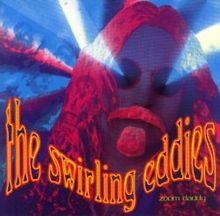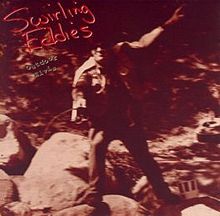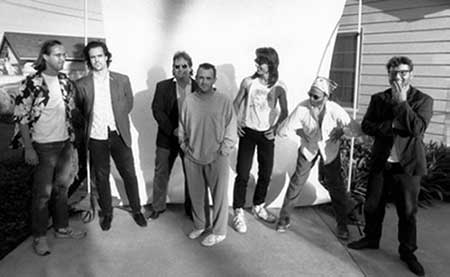A Primer on Christian Alternative Rock: The Swirling Eddies
WHO ARE THEY? Well, the short answer is that they’re Daniel Amos under assumed names and with a different drummer. After DA’s Darn Floor—Big Bite (1987), an intensely personal and difficult album, sold only seven thousand copies, the band seems to have decided it was time for a change. Welcoming DA’s former guitarist and keyboardist, Jerry Chamberlain and Rob Watson, back into the fold, they recorded two albums of raucous, strangely angry, party rock, using a variety of ridiculous monikers: Camarillo Eddy, Spot, Gene Pool, etc.
Harvest Rock Syndicate even ran a contest inviting readers to “guess the Eddies.” I don’t know what the results were, but the band certainly didn’t try to hide their identities too much—Camarillo Eddy is very clearly Terry Taylor singing in a weird inflection, and the Swirling Eddies albums aren’t that big of outliers for a band whose entire career has consisted of outliers. It’s not even enough to say that the Swirling Eddies are “funny,” while Daniel Amos is “serious”—DA, after all, is the band that recorded “Autographs for the Sick” and “She’s a Hard Drink,” and the Eddies put out a whole album, Zoom Daddy, of serious songs with ridiculous titles.
GENRE TAGS (OTHER THAN ALTERNATIVE ROCK): Folk-Rock, Funk Rock, Indie Rock, Novelty, Pop/Rock, Post-Punk, Singer/Songwriter
RIYL Tom Petty, R.E.M., They Might Be Giants, “Weird Al” Yankovic
WHY DO I KNOW THAT NAME? Terry Taylor produced a bunch of Christian rock records in the 1980s and ‘90s, but his alter ego Camarillo Eddy had a somewhat quieter career outside the band.
WHAT’S THEIR BEST SONG? “Pyro Sets a Wildfire” from Zoom Daddy, pretty close to a perfect alternative pop song.
DISCOGRAPHY
MUST-HEAR
Zoom Daddy (1994). My favorite Swirling Eddies album is their least typical—they go by their real names, for one thing, and while the song titles (“I Had a Bad Experience with the C.I.A., and Now I’m Gonna Show You My Feminine Side,” say, or “Disco Love Grapes”) suggest novelty songs,  the lyrics themselves aren’t all that funny. The backing tracks, it turns out, were recorded (improvised, I believe) live in the studio by Terry Taylor on guitar, Tim Chandler on bass, and Dave Raven on drums. The songs were then named based on what they sounded like without lyrics, and Taylor wrote the lyrics at home, always sticking with the theme suggested by the titles.
the lyrics themselves aren’t all that funny. The backing tracks, it turns out, were recorded (improvised, I believe) live in the studio by Terry Taylor on guitar, Tim Chandler on bass, and Dave Raven on drums. The songs were then named based on what they sounded like without lyrics, and Taylor wrote the lyrics at home, always sticking with the theme suggested by the titles.
The results are fantastic—Taylor himself has said that he’s never written better lyrics than the ones on Zoom Daddy, and very few records by anyone have lyrics this literate and intricate. Take a stanza at random, from the Edgar Allan Poe lounge number “Nightmare at the Elks Lodge”:
Now she floats through the walls and the streamers
Her hair gathers moonlight, confetti, and stardust
She escapes from the holdouts, the has-beens and dreamers
The cold, hopeless lust, the termites and rust
I’m not sure it would have been possible to begin with those lyrics—which are beautiful and evocative in their macabre elegance. Taylor had to have the music there, fully formed, first. The result is that the songs on Zoom Daddy have more words, and stranger words, than any other Taylor record. And I mean stranger in terms of the words themselves, not just their combined meaning. This album uses words like squaliform, coredemptrix, orthodoxly, and quisling—all of which are real words that did not appear in the dictionary I looked them up in when I was obsessed with this album at age sixteen. Oh, and he also sings about a quarter of “Sweet Mother of God” in dog Latin.
The music’s pretty great, too—Taylor’s voice is in fine form, and every track features dozens of him, in a multitracked mise-en-abîme. (The intricacy of the backing vocals is perhaps even more impressive than the intricacy of the lyrics.) The other members of the band provide a remarkably diverse group of songs, ranging from the phony James Bond theme of “Bad Experience” to the polka of “God Went Bowling” to the atonal squall of “Art Carney’s Dream.” This is mysterious, beautiful stuff, music that gets stranger and more appealing every time I hear it. I don’t know another album that lives in the same universe as Zoom Daddy.
Outdoor Elvis (1989). The Eddies’ second album is one of the most brutal critiques ever leveled against evangelical culture—over the course of 65 minutes, it tells us that evangelicals are credulous (“Outdoor Elvis,” “Urban Legends”), that they are anti-intellectual (“Tiny Town”), that they are obsessed with power, money, and celebrity (“Mystery Babylon,” “Attack of the Pulpit Masters,” “All the Way to Heaven”), that they refuse to listen to wise counsel (“Hell Oh,” “Rubber Sky”), that they are hypocrites, and predictable hypocrites at that (“Hide the Beer, the Pastor’s Here,” “Knee Jerk”).
 It’d be an unbearably angry album if it weren’t so damned funny. The title track is a great example—it’s a Weekly World News sendup that conflates Elvis with Bigfoot, and it features one of the funniest lines ever included in a rock song: “You can pretty much tell that he’s lost weight by the depth of his footprint.” And yet there’s a sadness underneath the joke. “If we don’t have the king, what have we got?” wonders the protagonist. “Life don’t make no sense.” Camarillo has laid bare the vacuity and meaninglessness of modern life, and he’s done it in a catchy song that makes me laugh twenty years after I first heard it.
It’d be an unbearably angry album if it weren’t so damned funny. The title track is a great example—it’s a Weekly World News sendup that conflates Elvis with Bigfoot, and it features one of the funniest lines ever included in a rock song: “You can pretty much tell that he’s lost weight by the depth of his footprint.” And yet there’s a sadness underneath the joke. “If we don’t have the king, what have we got?” wonders the protagonist. “Life don’t make no sense.” Camarillo has laid bare the vacuity and meaninglessness of modern life, and he’s done it in a catchy song that makes me laugh twenty years after I first heard it.
Ditto for “Hide the Beer,” probably the most infamous Swirling Eddies song. It’s a raucous party anthem written for Christian colleges (many of which are name-checked in the song and in its joyous, ridiculous coda), where alcohol is verboten. But the second verse—in which the “Scripture Man” busts a party, then sexually assaults one of the women—makes it clear that the hypocrisy that festers in such environments isn’t all that funny.
Along the way, there are sheer absurdities like “Coco the Talking Guitar” and “Don’t Hate Yourself,” and there are moments of real sentiment, like “Blowing Smoke” and “Hold Back the Wind, Donna.” And it’s important that the album ends with two tracks of self-recrimination, “Strange Days” (“We vowed to search the highways for an honest man / But when we looked into each other’s eyes / We knew it would be best to make some other plans”) and “The Band That Won’t Go Away” (“You’re no more misunderstood than anybody else”). Outdoor Elvis is newly relevant for the Trump Era—but only if evangelicals in Camarillo’s corner are willing to take unflinching looks at themselves, as he is.
The big flaw in Outdoor Elvis is that Terry Taylor has gone all-in on his “Camarillo Eddy” voice—a bizarre combination of throaty and nasal that is an acquired taste to be sure. So it may take a few listens to hear past some of the novelty aspects of the record—but it’s worth the time.
NEXT STEPS
The Midget, the Speck, and the Molecule (2006). This comeback record is only technically a Swirling Eddies album—of the original Eddies, only Camarillo, Spot, and Berger Roy Al appear. The record is filled in by a variety of new Eddies, whom I take to be the members of the Choir plus Mike Roe. Also, Eddie De Garmo sings backing vocals, suggesting he’s got a better sense of humor about  the Eddies’ covers of “I Use the J Word” and “God Good, Devil Bad” than we might have assumed.
the Eddies’ covers of “I Use the J Word” and “God Good, Devil Bad” than we might have assumed.
The album, not to put too fine a point on it, is all about success and failure—which, as “It All Depends” suggests, may be two names for the same thing. “Giants in the Land” presents an aging rock band “playing badass licks while they lose their looks”; “A Medley of Our Hit” is maybe the angriest Eddies song ever, criticizing the band’s own fans for their impatience before concurring, with St. Paul, that “this is really nothing at all”; and “My Cardboard Box” is a winking look at what life as an aging Christian singer/songwriter is really like.
Like Daniel Amos’s comeback record, Dig Here, Said the Angel, Midget rocks harder than anything in the Swirling Eddies catalogue—but there are also a number of more psychedelic moments, especially in “Salton Sea” and “Madonna Inn,” both of which are named after California, uh, landmarks. The title track also qualifies, returning to the vanishing hitchhiker imagery of “Urban Legends” in an entirely different musical genre.
Let’s Spin (1988). The Swirling Eddies’ debut announces itself with its title track, a swirling (sorry), spinning (sorry again) bit of rather mechanical funk rock with lyrics so light they constantly threaten to float away. I can’t help but hear it as a reaction to the previous year’s Darn Floor—Big  Bite, which was lyrically heavy to the point of exhaustion at times. Fortunately, Terry Taylor can’t avoid the sublime even in the midst of the ridiculous, and Let’s Spin is full of both of them: the jangly “Catch That Angel” and the yearning, beautiful Beach Boys homage “What a World, What a World” show his emotional range, while “I’ve Got an Idea” (with its iconic, lisped introduction, courtesy of bassist Berger Roy Al/Tim Chandler) is great fun.
Bite, which was lyrically heavy to the point of exhaustion at times. Fortunately, Terry Taylor can’t avoid the sublime even in the midst of the ridiculous, and Let’s Spin is full of both of them: the jangly “Catch That Angel” and the yearning, beautiful Beach Boys homage “What a World, What a World” show his emotional range, while “I’ve Got an Idea” (with its iconic, lisped introduction, courtesy of bassist Berger Roy Al/Tim Chandler) is great fun.
There’s also a serious apocalyptic undercurrent to all this frat rock: “The Big Guns” envisions a cycle of nuclear destruction, and “Rodeo Drive” finds the antichrist visiting tourist hot spots. “Don’t Ask Me How I Feel” (the least successful song here) complains of an “apocalyptic breakdown.” Even the protagonist of the otherwise sunny “Ed Takes a Vacation” reads the Bible in his hotel room “because he really believes / He’ll be going home soon.” All this unease would make its way to the surface on Outdoor Elvis, but for the time being it simmers underneath the cheery music.
WORTH A LISTEN
Sacred Cows (1996). Sacred Cows is probably the most mean-spirited record ever released on a Christian label—Star Song, in fact, the home of the Newsboys and the Gaither Vocal Band. It consists of covers of “songs that helped us,” as the liner notes put it. The covers demonstrate the sheer stupidity of the lyrics of the songs: DeGarmo and Key’s “God Good, Devil Bad” is turned into a polka sung by someone whose tongue is too thick for their mouth; Camarillo (or someone?) lisps his way through Carman’s Old West allegory “Satan, Bite the Dust”; and Spot sings Audio Adrenaline’s “Big House” as Droopy Dog. The results are, predictably, mixed, but the lounge version of DC Talk’s “I Luv Rap Music” makes me laugh every single time. As the young people say, I ain’t down wid dat.
THE DISCOUNT BIN
The Miracle Faith Telethon (Dr. Edward Daniel Taylor, 1990). As the name of the artist suggests, this bizarre compilation/outtakes album could be equally credited to Daniel Amos, Terry Scott Taylor, or the Swirling Eddies—I’ve chosen the latter because the interstitial comedy bits—a fake radio telethon in the style of Oral Roberts or Robert Tilton—would seem to belong more fully to the Eddies than to anyone else. The sketch comedy is pretty funny, especially when Dr. Taylor pulls out the “Fruit o’ Ministry” tote board, but I suspect the outtakes are a bigger draw: some remixes, three freshly recorded Daniel Amos songs (including a cover of the cowboy classic “Riders in the Sky” and the DA rarity “I’m on Your Team”), the uproarious “party version” of “Hide the Beer,” and the Stryper parody “Sprinkler Head.”
Swirling Mellow (1989). Between Let’s Spin and Outdoor Elvis, Gene Pool (Greg Flesch) put out an album of reimagined versions of the songs on Spin—reimagined, that is, as an ungodly combination of bit music and easy listening, played on what sounds like a $20 Casio. It is the definition of inessential, but the amazing thing is how not bad it is. The arrangements are more interesting and intricate than they have any right to be, and Flesch varies the sounds on each track. “Catch That Angel” apes Les Baxter-style exotica (albeit with a synth lead), and “Rodeo Drive” features a truly ridiculous fake trombone. But the best track is “What a World, What a World,” which moves beyond the album’s premise into something genuinely beautiful.
FOR FANS ONLY
Meat the Farmbeetles (The Farmbeetles, 1998). Almost the definition of a fans-only release—and never conceived as anything else—Meat the Farmbeetles features parody country renditions of Beatles songs like “Bertday” and “Strawburry Fields.” Nobody needed this record, and nobody asked for it, but it might give you a laugh or two.
GREATEST HITS, ETC.
Besides The Miracle Faith Telethon, which is kind of a greatest-hits compilation, there’s 1995’s The Berry Vest of the Swirling Eddies, which has a lot of their best songs, along with the pre-Eddies “Like Lazarus”—recorded under the name Crime Horse—and two acoustic tracks, “With the Tired Eyes of Faith” and “Glorious Dregs,” which are very nice but not Swirling Eddies songs in any meaningful way. The cassette version also features a hidden track in which Camarillo reads an angry “fan” letter, backed by ridiculous sound effects.
LIVE ALBUMS
Well, there are none. There’s a bootleg of their 1990 Cornerstone Festival concert floating around online, but the sound quality is too terrible for me to recommend it.
SIDE PROJECTS
The Swirling Eddies pretty much are a side project, for Daniel Amos, Terry Taylor, the Lost Dogs, and Adam Again (all of whom will eventually receive their own essays). Drummer Hort Elvison (aka Dave Raven–itself an assumed name!) also played for a band called Mojo Monkeys, about whom I know nothing.

[…] and Christine Glass The Choir Happy Christmas, Vol. 1 Mark Heard L.S.U. Poor Old Lu Starflyer 59 The Swirling Eddies […]
[…] and Christine Glass The Choir Happy Christmas, Vol. 1 Mark Heard L.S.U. Poor Old Lu Starflyer 59 The Swirling Eddies […]
Micial Farmer is why I got ZOOM DADDY (The Swirling Eddies)and MOTORCYCLE (Daniel Amos) uploaded. Read this and weep, ye mighty!